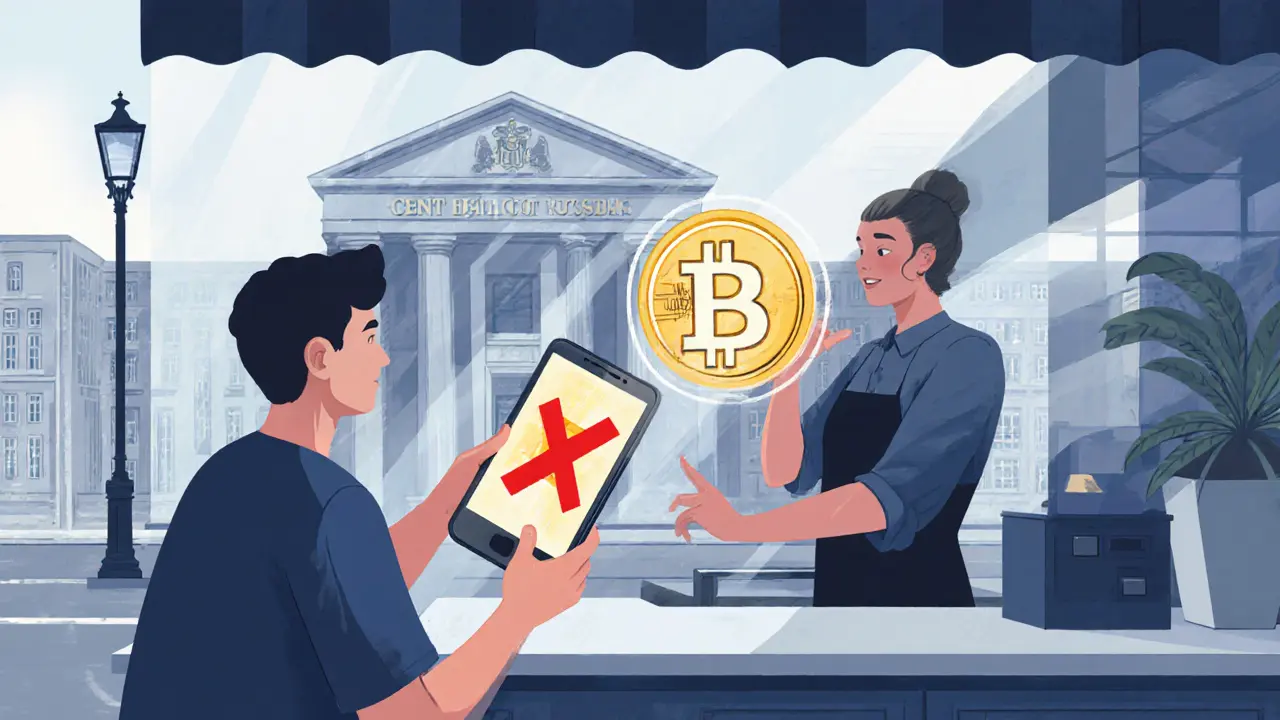Crypto Payment Penalty Calculator
Calculate Potential Penalties
Enter the amount of crypto used in a domestic transaction to see potential fines and consequences according to Russian law.
Penalty Details
TL;DR
- Owning crypto is legal in Russia, but using it to pay for goods or services inside the country is prohibited.
- The only lawful way to use crypto for payments is through the Experimental Legal Regime, and only for cross‑border settlements.
- Violating the payment ban can lead to fines of 100,000-200,000RUB for individuals and up to 1millionRUB for companies, plus possible confiscation.
- All crypto‑related income must be reported and converted to rubles; failure to do so can trigger heavy tax penalties or even imprisonment.
- Future legislation may keep domestic bans while expanding the experimental regime for international trade.
What the law actually says
In Russia, the legal framework separates two concepts: cryptocurrency ownership is a right for citizens to hold digital assets, but cryptocurrency payments are explicitly banned for domestic transactions. The 2023 Federal Law on Digital Assets makes it clear that the Russian ruble (Russian ruble) remains the sole legal tender. Anything else, including Bitcoin, Ethereum, or stablecoins, cannot be used to settle everyday purchases.
Why the ban exists
The Central Bank of Russia has repeatedly warned that crypto threatens monetary stability and could bypass sanctions. By keeping payments in rubles, the government aims to retain control over capital flows and prevent a parallel payment system that might undermine the national currency.
Exception: the Experimental Legal Regime (ELR)
Since 2024, Russia runs a narrow Experimental Legal Regime for crypto. The ELR permits international settlements in digital assets, but only for companies that qualify as “highly‑qualified investors” or have special permission from the Russian Treasury. The goal is to give Russian exporters a way around Western sanctions while keeping the ruble dominant at home.
Key points of the ELR:
- Only cross‑border transactions are allowed - no domestic buying or selling.
- Participants must register with the Ministry of Finance and undergo quarterly reporting.
- Trading volumes under the regime topped 1trillionRUB in 2025, showing strong demand.
Domestic payment ban: fines and confiscation
Starting in 2026, the State Duma plans to enforce the ban with steep penalties. According to Anatoly Aksakov, head of the Duma’s financial market committee, the draft law sets fines as follows:
| Who | Fine range (RUB) | Additional penalty |
|---|---|---|
| Individual | 100,000 - 200,000 | Possible confiscation of the crypto used |
| Legal entity | 700,000 - 1,000,000 | Confiscation and potential suspension of license |
The law also empowers authorities to seize any digital assets exchanged in violation, turning the crypto into rubles at the official rate before returning them to the state.

Tax reporting requirements
Even though payments are banned, the tax code treats every crypto‑related income as taxable. The rules are strict:
- Report all crypto income by April30 for the previous year.
- Pay the calculated tax by July15.
- Convert earnings to rubles using the Central Bank’s official exchange rate.
Failure to report can trigger a tiered penalty system. For example, if a taxpayer hides transactions worth 45millionRUB in two of the last three years, they could face fines of 500,000-2,000,000RUB, forced labor up to five years, or imprisonment ranging from 18months to fiveyears. Smaller oversights still attract 50,000RUB fines and up to a 40% surcharge on unpaid tax.
Taxable activities include spot trades, mining rewards, staking yields, airdrops, lending returns, NFT sales, and any profit from digital financial assets (DFAs). Mining and trading are exempt from VAT, but the income itself feeds into the personal or corporate income‑tax base.
How businesses cope with the restrictions
Many Russian firms sidestep the ban by routing crypto payments through offshore subsidiaries that fall under the ELR. This adds compliance costs-annual reporting, legal counsel, and licensed exchange connections-but it keeps the business operational in the face of sanctions.
For small retailers, the simplest path is to avoid crypto altogether and accept only rubles or foreign fiat via licensed banks. Some start‑ups experiment with “stablecoin‑backed vouchers” that are technically fiat‑linked, but regulators often view them as a workaround and may shut them down.
Impact on everyday users
Ordinary Russians can still buy, sell, and hold crypto on foreign exchanges. However, they cannot use crypto to pay for a coffee, a ride‑share, or rent an apartment. The ban pushes many users toward peer‑to‑peer trades on messengers, which the government monitors closely.
According to the Russian Association of Cryptoeconomics, AI, and Blockchain, the number of crypto users grew 15% annually since 2021, with holdings now exceeding $40billion. Yet Russia slipped out of the top‑10 in Chainalysis’s 2025 Global Adoption Index, reflecting the constraints placed on practical usage.
Future outlook
Legislators are split. While the Central Bank pushes for an outright domestic ban, figures like Ivan Chebeskov, Deputy Head of the Russian Treasury argue that a broader digital‑asset strategy could boost the economy. If the experimental regime proves valuable for international trade, we may see a gradual expansion-perhaps more sectors gaining permission to settle foreign invoices in crypto.
For now, the safest bet for anyone in Russia is to treat crypto as an investment, not a payment method. Keep thorough records, convert earnings to rubles for tax purposes, and stay updated on any regulatory tweaks that might affect the ELR.
Frequently Asked Questions
Can I use Bitcoin to buy groceries in Russia?
No. Domestic purchases with any cryptocurrency are prohibited by law. The only legal use is for cross‑border settlements under the experimental regime.
Is it illegal to own crypto in Russia?
Owning crypto is not illegal. You can hold, trade, and earn on digital assets, but you must report any income and cannot use them for payments inside the country.
What are the penalties for paying with crypto domestically?
Individuals face fines of 100,000-200,000RUB, while companies can be fined 700,000-1,000,000RUB. The crypto used in the illegal transaction will be confiscated.
Do I need to convert my crypto earnings to rubles for tax filing?
Yes. All crypto‑derived income must be reported in rubles, using the official exchange rate set by the Central Bank.
Can businesses use crypto for international invoices?
Only if they are registered under the Experimental Legal Regime and meet the “highly qualified investor” criteria. Regular domestic firms cannot use crypto for any payments.


Looks like Russia is tightening the crypto noose.
Honestly, the draft's vague language actually opens a backdoor for offshore mining farms by exploiting tax arbitrage, so the “penalties” might just be a smokescreen.
While the legislative draft appears stringent, one could argue that its clarity may eventually foster a more regulated environment, thereby encouraging legitimate crypto enterprises to comply and thrive within a defined legal framework.
I hear you, and I’d add that for startups navigating this, partnering with experienced compliance consultants could turn these hurdles into stepping stones toward sustainable growth.
Yeah, the calculator is a neat tool, but remember it’s based on a draft, not final law. The fine ranges can swing dramatically depending on how courts interpret “domestic transaction”. Also, asset confiscation clauses could hit companies hard if they’re not prepared. Bottom line: keep records clean and stay ahead of any regulatory updates.
Frankly, the whole “crypto penance” narrative feels like a publicity stunt to scare newbies while the real power brokers stay untouched.
Sure, they talk about fines, but don’t forget the shadow agencies that monitor blockchain flows-every transaction is probably already flagged in some hidden ledger.
Another fine list, wow.
This reeks of authoritarian overreach, trampling on financial freedom under the guise of consumer protection.
Congrats Russia you win.
Interesting! The draft seems comprehensive, yet one must consider the broader implications-how will these penalties affect market liquidity, investor confidence, and cross‑border transactions?
One might reflect that law, at its core, seeks to balance order with liberty; when the scales tip too far, innovation suffocates. In the Russian context, the tension between state control and decentralized finance becomes a microcosm of this age‑old debate. Thus, the penalties are not merely monetary but symbolic of a deeper societal negotiation.
i think the orginhits need to be more clear, otherwise ppl will just avoid crypto all togethr.
Meh, typical bureaucracy.
Honestly, it feels like they’re setting a trap-publish these massive fines to scare the average user while the elite continue trading behind closed doors. Every time a new rule drops, another offshore enclave pops up to host the real action. It’s a cat‑and‑mouse game, and we’re the ones left holding the leash.
Behold! The grand theater of regulation unfolds, where lawmakers don their capes and wield fines as swords-yet the true battle rages in the shadows of code.
Yo, the API spec for the penalty engine is totally under‑documented, which means devs will have to hack together custom parsers just to display the fine matrix.
Ths is just grea adnittion to the confuson already present.
Oh joy, another Russian crypto rulebook that reads like a novel written by a bored bureaucrat.
Each clause seems designed to trip up the unsuspecting, with fine ranges that swing from a modest slap on the wrist to a full‑blown financial guillotine.
They've even tossed in asset confiscation, because nothing says 'welcome to the market' like the threat of your digital wallet being seized.
The draft mentions 'domestic transactions' without defining whether swapping on a decentralized exchange counts, leaving users in a fog of ambiguity.
Meanwhile, the enforcement agencies are apparently equipped with proprietary blockchain scanners that no one else can see.
In practice, this means that the average trader will spend more time decoding legalese than actually trading.
And let’s not forget the inevitable loopholes that will be exploited by the well‑connected, rendering the whole exercise a performance piece.
The calculator UI itself feels like an afterthought, with barely any guidance on how the numbers translate to real‑world consequences.
If you input a modest amount, the system spits out a fine that could bankrupt a small startup, which is… delightful.
On the flip side, large firms might simply write off these penalties as a cost of doing business, shrugging off the moral outrage.
The underlying message is clear: the state wants to appear tough on crypto, regardless of the actual impact on innovation.
Such heavy‑handed approaches often backfire, pushing developers to seek refuge in jurisdictions with friendlier regulatory climates.
In short, the draft is a mixed bag of intimidation tactics, vague definitions, and selective enforcement.
If you’re planning to operate there, brace yourself for a rollercoaster of compliance audits and surprise penalties.
Or, you know, just stay home and watch the drama unfold from a safe distance.
Hey folks, despite the heavy fines, there are still ways to stay compliant and keep your projects alive-just stay informed and be proactive!
It is advisable to consult with seasoned legal counsel specializing in Russian financial legislation to navigate these complexities effectively.
Keep your head up, stay transparent with your users, and you’ll ride out these regulatory waves just fine.
The proposed penalties demonstrate a profound misunderstanding of blockchain economics, serving more as a political statement than a measured regulatory approach.
So, just to be crystal clear, are we supposed to treat every crypto transaction as a felony, or is there a secret “acceptable” threshold that you’ll conveniently overlook?